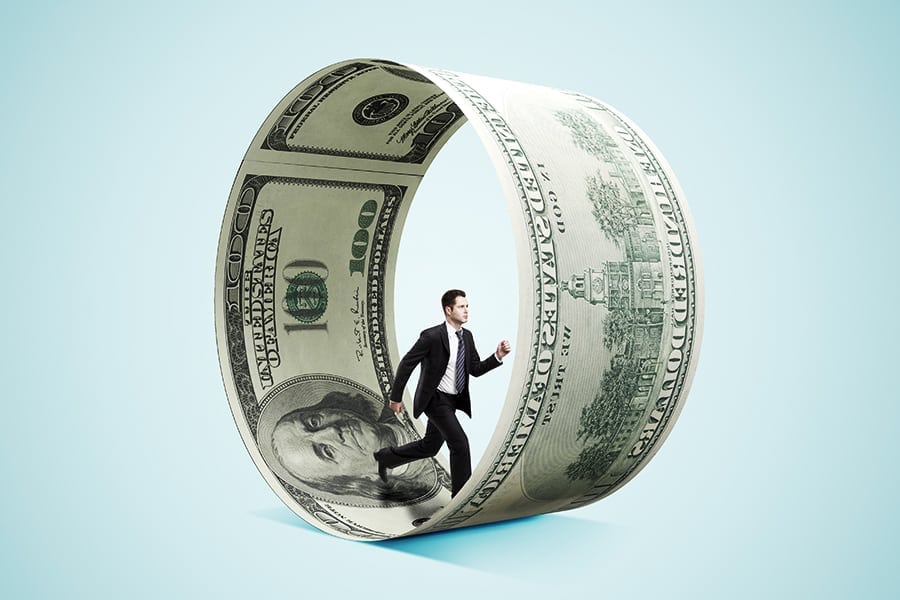A common axiom in society is, “You don’t talk about sex, religion or politics.” The fourth, unspoken tenet is, “…and don’t talk about money!”
Folks get real itchy when the subject comes up.
I have to admit that until I got control of my finances and gained some financial discipline, I was squirmy too.
While I’m not a millionaire yet, I do sleep better.
Moreover, I believe that as long as I don’t call anyone names, I can get away with talking about anything.
I spent years as a stand-up comedian and also conducted sales training in my company.
I treated them both the same. I’d rather tell the truth. I don’t need to hear what I want versus what’s good for me.
However, you’re reading this blog on this particular website, because you are looking for some suggestions.
Well, that’s what I’m here for.
Why Financial Discipline is a Good Idea
The Latte Factor
David Bach’s book, The Latte Factor is required reading by anyone remotely serious about giving themselves a raise and practicing financial discipline.
In it, he decries the Starbucks phenomena.
Five dollars for a grande mocha, frappe whatsis with a shot of macadamia espresso…First off, it’s coffee with milk. You can make this at home.
If you’re in a hurry, 7-11 has coffee for $1.50 and you can add milk and bam! Mocha coffee, and it’s not that 400 degree burnt swill.
I have done the black coffee taste test with people and 7-11 always wins…true story.
Here’s how not minding some habits can kill your finances.
A latte at $5/day x 7 days = $35 a week. Now, multiply that by 52 weeks a year, and that’s a total of $1,820 a year!!!
That’s a down payment on car, a security deposit or a year’s worth of student loan payments.
Two years, and you have almost four grand socked away — if you practice financial discipline.
We all have various habits that can kick our butt financially. What are yours?
Is eating out every night a good idea? You can probably cook more at home, and it’d probably be better for you.
If you have a fridge in the office, hit up Trader Joe’s or a super market. They have ready-made salads, sandwiches and soups. Five days worth is nearly half of eating lunch out every day. What’s $25 or $30 bucks a week in a year?
I also recommend not putting a ton into a 401k or mutual fund.
Robert Kiyosaki, author of Rich Dad, Poor Dad, suggests that no more than 10% of your net worth should be in stocks, which is what mutual funds or 401k’s are comprised of — not pixie dust.
If you do invest, don’t make your entire 401k the company stock. Spread it out or diversify. If your company is publicly traded, buy a few shares per pay period and don’t go nuts.
Enron wasn’t that long ago, remember…
Discipline Can Be a Drag…
Back in the day, saving or putting away for retirement was a little bit of a chore.
Now, everything is automatic.
You can have your student loan, car payment, retirement plan, and home loan, among other things, deducted out of your paycheck.
You get used to it, and it becomes less of a pinch.
Also, sock away cash in a closet or something. Seriously, that just comes in handy.
You can have a percentage of your paycheck go to a savings account, even at another bank, automatically.
Set the number at 10% at first.
That may seem like a lot, but understand the United States is among the worst of 23 industrialized countries at saving.
Here’s a short list:
- France: 15.4%
- Australia: 11.1%
- Germany: 9.9%
- Spain: 9.1%
- UK: 5.8%
- Ireland: 5.0%
- Canada: 5.0%
- US: 4.5%
- Japan: 0.8%
We’re not dead last, but we’re not great. We used to be 19th out of 23, and for the first time since the 70s, we beat Japan.
Here’s the thing; if you have a $100, you can put away $10! That’s TWO dopey lattes.
Think Twice, Then Saw…
One day I was at my buddy’s house, and we were watching a game.
His sound system was amazing. I knew I had to have one.
A couple of days later, I was at a Costco and saw the same system.
The price wasn’t too bad at $300.
However, I didn’t buy it right there. I pulled up eBay on my phone, entered the make and model number and found the exact same system for $110 with free shipping.
I paid for the two year warranty which was $15.
Total cost $125, and I only had to wait four days.
Is $175 extra something you could use? I do this all the time.
I learned another trick from my girlfriend in college.
We were out shopping one day, and she was trying on boots.
We must have gone to five stores, and she tried on four or five pairs of boots at each store.
Driving home, empty handed, I asked her why she didn’t buy this pair or that pair?
I never forgot what she said, “If one pair jumps out at me in a couple days, I’ll go back. They’ll still be there.”
She never went back.
Mind you, she bought clothes and shoes all the time…she was a girl in college.
However, she had a discipline that breaks most of us who do not.
Impulse buying was why malls were invented. While they’re fun, they can also be devastating financially.
Get Paid, Save, Repeat…
I mentioned ways to allocate portions of your paycheck so you don’t have to think about paying your bills or yourself.
With half of U.S. wage earners making less than $30,000 a year, this is harder for some than others.
Alas, bills must be paid.
To be brutally frank, people get embarrassed about picking up a second job. Who cares?
If you make $40,000 a year and pick up an Uber route, bringing in $15,000 extra on three nights work, why not?
Get a real estate license and sell houses on the weekend.
3% commission of a $300,000 sale of a home is $9,000 extra, and you weren’t digging ditches to do it.
There are a ton of things we can do.
Having two incomes is just smart.
What if you lose your job?
If you have some cash squirreled away, and you have a second job or business, you’re not freaking out.
Set Up Habits for Life
Back in the late 70s, Jay Leno was a struggling comedian who sold cars. When comedy started paying him well, he kept selling cars, living on that money.
His attitude was selling cars paid the bills, and his stand up money got socked away in savings, real estate, etc.
There were a few years when he could no longer sell cars because of constant touring.
However, he kept guest hosting the Tonight Show when Johnny Carson was away and would also mind his investments. In 1992, he took over for Johnny, starting at eight million dollars a year, ending in 2009 at thirty-two million dollars a year.
Here’s the deal; he never touched the TV money.
Like his used car days, the four million a year he’d make on the weekends touring is what he lived on.
He has always lived on what was paying less, saving the larger amount and practicing great financial discipline.
“Oh yeah, but he’s Jay Leno! I can’t do that!” If he could do that when he was selling cars, I promise so can you.
Have you struggled with financial discipline in the past? Let us know if this helped!


Leave a Reply